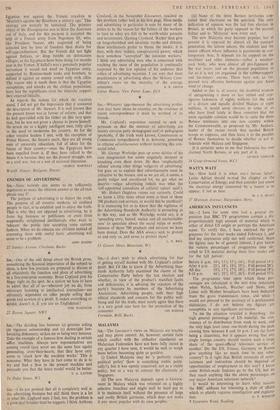AMERICAN INFLUENCES
SIR,—I have for some time had a general im- pression that BBC TV programmes contain a dis- proportionately high amount of material which is either of direct US origin or portrays the American scene. To verify this, I have analysed the pro- grammes for the four weeks ended February 1, and find my impression only too well confirmed. Since the figures may be of general interest, I give below the various percentages of programme time de- voted to US material during these four weeks and for the full period :
Before 6 p.m. 14% 13% 15% 14%. Full period 14% After 6 p.m. 22% 18% 19% 19%. Full period 20% All day 19% 17% 17% 18%. Full period 18% 8-10 p.m. 44% 32% 35% 36%. Full period 37% The programme time upon which these per- centages are calculated is the nett time remaining when Welsh, Schools, Weather and News, and Listen with Mother broadcasts have been deducted from the gross transmission times, and while I would not pretend to the accuracy of a professional statistician, 1 do not believe my figures are susceptible to any significant correction. To me the situation revealed is disturbing: the high general percentage of US material, the con- sistency of its distribution from week to week, and the very high level (over one-third) during the peak viewing time between 8 and 10 p.m. I am far from being a chauvinist, but it appears wrong that any single foreign country should receive such a large share of the quasi-official television service of another. Do the US, France, Germany or Russia give anything like so much time to any other country? Is it right that British resources of enter- tainment and instruction should be deprived of opportunities of employment in this way? I know some British-made features go to the US, but do they reach anything like the above percentages on any major American television network?
It would be interesting to learn what reasons the BBC adduces for tolerating a state of affairs which so plainly requires investigation and explana-


































 Previous page
Previous page